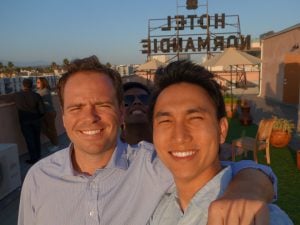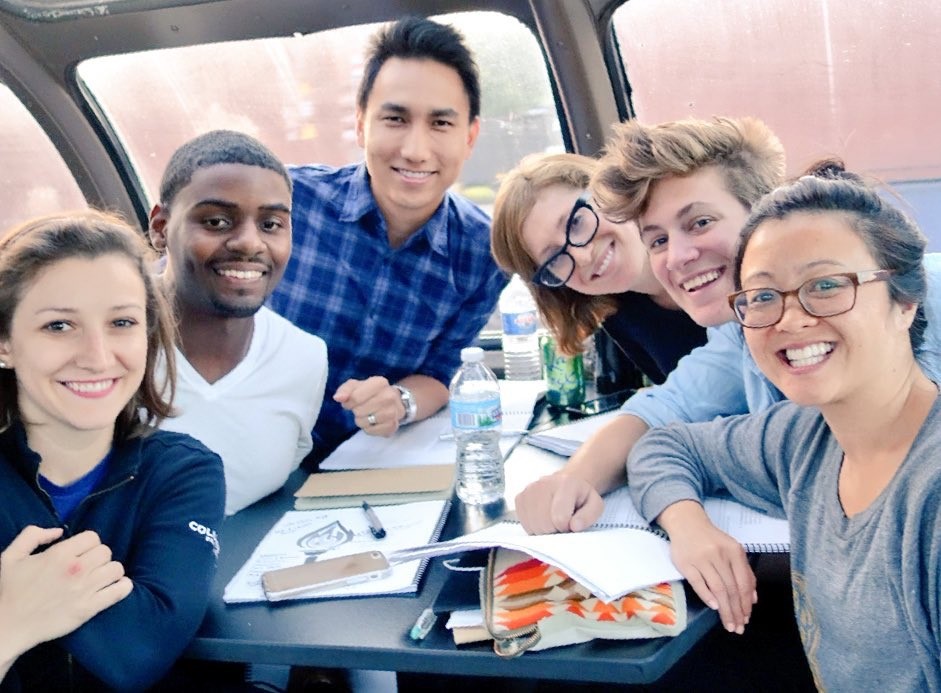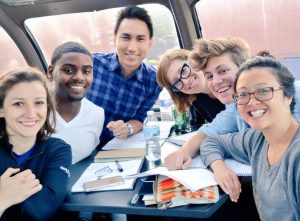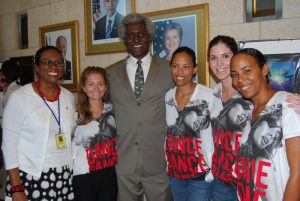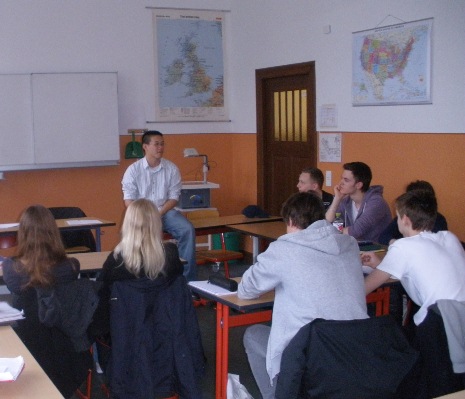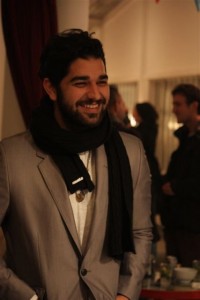 As last year drew to a close, I could not help but feel a longing for what had transpired during my Fulbright grant. I missed the kids I worked with from three orphanage centers in Morocco. From the Darna Association, by the beautiful cliffs looking out to Spain from Tangier, to the kids at the Dar Lekbira Association, near Mehdi beach in Kenitra, to the open spaces of Bensaliman, where I worked with young Moroccan artists and the Ministry of Youth on a U.S. Embassy-sponsored event. I missed the dirt in our hands, the kids’ enduring spirits, their old eyes, their youthful energy and contagious smiles. Most importantly, I miss their brilliance and creativity.
As last year drew to a close, I could not help but feel a longing for what had transpired during my Fulbright grant. I missed the kids I worked with from three orphanage centers in Morocco. From the Darna Association, by the beautiful cliffs looking out to Spain from Tangier, to the kids at the Dar Lekbira Association, near Mehdi beach in Kenitra, to the open spaces of Bensaliman, where I worked with young Moroccan artists and the Ministry of Youth on a U.S. Embassy-sponsored event. I missed the dirt in our hands, the kids’ enduring spirits, their old eyes, their youthful energy and contagious smiles. Most importantly, I miss their brilliance and creativity.
In Morocco, my Fulbright project used the arts to empower disadvantaged youth on a micro level as a means towards improving the United States’ relationship with the Muslim world on a macro level. The project became the Lollipops Crown Music and Arts Initiative.
I had applied for a Fulbright grant three times. On my first attempts, it was difficult to overcome the disappointment of rejection, but with each successive try, I became increasingly aware of what I wanted to actually do. More importantly, I designed a project that I truly believed in — regardless of whether or not I received a Fulbright grant. In my application, I designed a blueprint for an endeavor that meant more to me than simply getting the grant. The project sought to make an impact in a Moroccan community. From that basic premise, I was able to get local support from orphanages in Morocco. That grassroots support was vital to the project’s implementation and to winning a Fulbright grant.
Once I was awarded a Fulbright grant, I had a limited idea of what I was getting myself into but I knew why I was going to do it. First, as a Muslim-American, I thought it was important for Muslims in the West to go to developing Muslims countries, live and work in them, learn from them, and share skills as means of fostering mutual understanding between one another’s societies. Currently, there seem to be increasing fissures between Muslims in the West and Muslims in the developing world. These fissures will only inhibit the greater Muslim World’s ability to silence extremists and for societies to progress spiritually and intellectually. Secondly, I thought it essential to use the arts to bridge the East-West divide between non-Muslim-Americans and Muslims in the East. Thirdly, I wanted to show how the arts are one of the few existing avenues to deconstruct myths held by different social classes, religions, countries, and cultures. The arts show us that no civilization is monolithic. They demonstrate that there is no one way to be Muslim, no one way to be human, and despite our diverse paths, the arts can unify us. The arts remind us of the collective humanity to which we equally belong. Lastly, I wanted to showcase how the arts can empower disadvantaged youth who otherwise have no space to address and express their grievances, dreams, and where they want to be. I wanted to create a space for creative and critical thinking as well as innovation. Spaces for such development are lacking for many youth in developing Muslim countries. This fuels a toxic combination of helplessness and humiliation that exacerbates today’s cultural and geopolitical challenges. As I have discovered, the talent, creativity, innovation and drive are there. Yet the outlets, resources, and most importantly, the state and societal support, are somewhat weak.
Through the Lollipops Crown Music and Arts Initiative, we were able to create a pilot youth arts education program that enabled disadvantaged children in Morocco to write, direct, film, and act in their own short stories about their hardships and dreams. The initiative additionally led music workshops teaching kids how to read music. I partnered with the U.S Embassy in Rabat in leading music workshops for the Ministry of Youth in Bensaliman . My band, Zerobridge based in NYC, led a tour of workshops for Arab youth across Morocco also sponsored and organized by the U.S Embassy in Rabat. The project left its mark in the culmination of a widely attended screening of all of the kids’ short films at the beautiful and historic Cinéma Rif Theater in Tangier.
When I left Morocco over a year later in March 2010, the last kids I saw were my group from the Dar Lekbira Orphanage. They were the first group of kids I met and worked with, so it was only fitting to say goodbye to them last. They changed my life, and from what they told me, the arts initiative gave them a little something to look forward to and confidence to hold on to. The initiative instilled awareness in them that there are spaces within us that are meant to be discovered: be they spaces for creativity, spaces for innovation, or even spaces for forgiveness. We cried together as I left. The kids pulled lint, coins and bracelets from their torn clothes and gave them to me as mementos. I will never forget them and the films, music and connections we created and discovered.
One of the toughest things I have ever done was to turn my back to the orphans and leave. As I walked at night on a dirt road, I saw their faces pressed against the windows. A train roared by to break the silence. There was a full moon in the Kenitra sky. The next night, I’d be looking at the moon from a plane. And it was in this parting moment that it hit me. Through the Lollipops Crown Music and Arts Initiative, we moved mountains. Despite the frustration, hunger, drugs, poverty and the broken families these orphans live every day, the creative spark and love we discovered through the arts helped us to overcome helplessness and hopelessness. We rose above them. Music, film, and art are avenues for true listening, understanding, and empowerment. As a Muslim-American who worked in Muslim-Arab country, I can say that the arts, not just politics, are real diplomatic tools in which the U.S. should continue to invest. The Fulbright Program, and its support of artistic projects, is so vital because it enables cultural and academic spaces to be created: interaction through people-to-people diplomacy, eye-to-eye, drum-to-drum, brush-to-brush, pen-to-paper, and hearts-to-minds. Programs for educational and cultural exchange, such as the U.S. Department of State’s Fulbright Program, continue to provide a platform from which meaningful relationships with other nations and people-to-people diplomacy can be achieved. The street kids, social workers, artists, and Moroccan people changed my life. Together, through my Fulbright project, we moved more than mountains. The Fulbright Program and State Department helped us to do this.
This summer, I will continue engaging in the cultural diplomacy started during my Fulbright project and implement a similar project for youth at an orphanage in South Asia’s embattled region of Kashmir, India. The orphanage is called CHINAR. These workshops will work on eroding the trust deficit between America and the Muslim world through arts education, empowerment, and communication.
Here are some tips to think about when starting your Fulbright application for a study or research project:
- First, think of a project that relates to enhancing educational exchange or cultural diplomacy between the U.S .and other nations. It should be something you are passionate about and something that will enhance your career.
- Identify a country that has a specific need for your project idea or research interests.
- Your Fulbright project does not have to be strictly limited to development or academic research. The Fulbright Program welcomes applications in all fields of study – including the arts, professional fields and sciences.
- Research and share your idea with institutions or non-governmental organizations that are in the country you’d like to work in. Securing a host affiliation is best done well in advance of finishing your application. Once you are awarded a Fulbright grant, plan to be flexible and patient in getting your original idea off the ground. It took me months to get the results and access I needed. It takes time to build trust and partnership networks. But, if your project is something you believe in, you will get there!
- If you don’t get the Fulbright, do not be discouraged. I applied three times! I tweaked my idea several times and grew more passionate about implementing the right project at the right time. Don’t give up!
Photo: Mohsin Mohi-Ud-Din, 2009-2010, Morocco
Questions for Mohsin about his Fulbright experiences? Feel free to email him at MMohi-Ud-Din.AlumniAmbassador@fulbrightmail.org.
